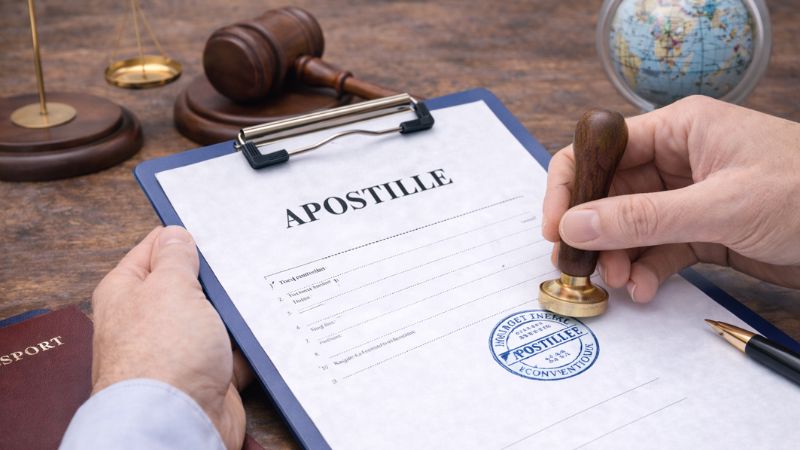If you plan to use your personal or business documents abroad for immigration, employment, or international trade, you need your documents to be certified with Apostille services in Singapore or authenticated through an embassy or consulate. Since Singapore became a member of the Hague Apostille Convention in 2021, a simplified Apostille certification is available for public and private documents for Hague countries through the Singapore Academy of Law.
Below, we take a closer look at Apostilles for educational documents, business documentation, immigration packages, and documents for overseas employment, and provide a step-by-step guide on how to get an Apostille in Singapore.
Key Takeaways
- If you plan to use your documents abroad, you need them certified with an Apostille or authenticated through legalisation with an embassy or consulate.
- In 2021, Singapore became a member of the Hague Convention, which enabled certification of documents for use abroad through an Apostille.
- You need to notarise all private (non-government-issued) documents with a Notary Public before certifying them with an Apostille. Notarisation of public documents for apostille is generally not required.
- You can obtain an Apostille through the Singapore Academy of Law by submitting the physical document on your own or using an Apostille service in Singapore for a more streamlined process.
What Is an Apostille?
An Apostille is a certificate issued by the Singapore Academy of Law that is attached to a public or private document, for example, your passport copy, educational diploma, business, or commercial documentation. The purpose of the Apostille is to confirm that the document it certifies is authentic and legitimate when submitted in any of the countries that are members of the Hague Apostille Convention.
Unlike the legalisation of documents required for countries that are not members of the Hague Convention, which involves multiple authorisations, certification with an Apostille is simpler and requires fewer steps. In September 2021, Singapore became a member of the Convention, which allows documents to be authenticated with an Apostille instead of legalisation, offering a faster and more efficient process.
Educational Certificate Apostille in Singapore
If you plan to submit your School Graduation Certificate, a university diploma, or another educational document received in Singapore to authorities abroad, you need to authenticate such documents before submission. You will need an Apostille for your educational certificate if the country where you plan to submit it is a member of the Hague Convention or a full legalisation process for non-member countries.
Business Document Apostille in Singapore
You can obtain Apostille certification for your business and commercial documents, including memorandums of association, joint-venture agreements, contracts, as well as invoices or certificates of origin, after notarisation or certification with relevant Chambers of Commerce in Singapore, as applicable.
Personal Document Apostille in Singapore
If you plan to use your personal documents issued in Singapore, for example, your ID, your marriage or divorce certificate, a will, or a power of attorney in a foreign country, you will need Apostille certification for countries that are members of the Hague Convention, or full legalisation for non-member countries.
Apostille for Immigration Documents in Singapore
In many countries, immigration authorities require Singapore-issued documents, such as birth or marriage certificates, a police report, graduation documents, and other personal documents, to be authenticated with an Apostille before accepting them for visa applications.
Singapore Apostille for Overseas Employment
If you plan to work abroad, you may need to have your educational documents, professional certificates, and other personal documentation apostilled before signing the employment contract or applying for a work permit.
Singapore Apostille Process: Step-by-Step Guide
You can obtain an Apostille for any of your documents by presenting them to the Singapore Academy of Law on your own or involving a notary team in Singapore.
When you work with a law firm offering Notary Public services in Singapore, the legal team will advise you on all the nuances and act on your behalf for the most expedient authorisation process.
Identifying the Type of Your Document
At the first stage, you will need to check if your document needs notarization by a Notary Public or if it can be certified by an Apostille without it. If your document was laminated, you will also need to obtain a certified true copy and an extract of the original document for legalisation.
Step 2: Notarisation for Private Documents if Required
If your document was issued by any Singapore Government Authority, it does not require notarisation for Apostille certification. For other private documents, you need to notarise them first before seeking an Apostille certification. Please note that the recipient of your documents abroad may still require notarised copies of the documents, so it is always recommended to check the actual requirements first.
Step 3: Apostilling Your Documents with the Singapore Academy of Law
If your document was notarised, the SAL will first verify the authenticity of the notary’s signature and seal before certification with an Apostille. The SAL affixes the Apostille Certificate to physical documents, which must be presented in person at the SAL office at Coleman Street, #08-06 The Adelphi, Singapore 179803, during its counter opening hours.
Step 4: Legalisation for non-Hague Countries
If you plan to use your document outside Hague Convention member countries, you will need a full chain of legalisation. This includes notarisation, authentication with the SAL, verification with the Ministry of Foreign Affairs of Singapore, and endorsement by the Embassy or Consulate of the foreign country where you plan to use this document.
Step 5: Collection and Delivery
If you apply for Apostille certification on your own, you will need to collect your documents in person from the Singapore Academy of Law. When you work with a notary team, you can collect the documents at their office or have documents delivered to your office or residence, if they provide this service.
How IRB Law Can Help
While you can seek authorisation with an Apostille or legalisation on your own, contacting an experienced notary team can help you speed up the process and deliver the peace of mind that all the legal requirements will be met.
When you turn to the IRB Law notary team for authorisation with Apostille or legalisation, we will:
- evaluate your documents and your situation and advise you if you need notarisation, certification with Apostille, or a full legalisation chain,
- provide you with professional notarisation services, as needed,
- arrange for copies of the documents, when required,
- apply for an Apostille to the Singapore Academy of Law on your behalf,
- If you need to submit your documents in countries that are not members of the Hague Convention, we can further provide you with full legalisation services for your documents with the Ministry of Foreign Affairs and embassies.
Additionally, our mobile notary team can collect your documents at your door and deliver them to you after Apostille certification to save your time, office visits, and long waits.
Conclusion
After Singapore became a member of the Hague Convention in 2021, you can certify your documents for use in Hague member countries with an Apostille. You can obtain Apostille services in Singapore through the Singapore Academy of Law directly or turn to a law firm offering Notary Public services for a more expedient and personalised process. If you need additional information about certifying your documents for use abroad or are looking for personalised support, please don’t hesitate to contact the IRB Law notary team for Apostille services in Singapore.
FAQs
Do I need notarisation of documents before Apostille?
If you seek Apostille certification for any private (non-government) document, you need to have it certified by the Notary Public or a law firm offering this service. The notarisation of your public documents issued by any Singapore Government Authority is not required for Apostille, but may still be needed by the document recipient in a foreign country. Please don’t hesitate to turn to the IRB Law notary team for a free initial consultation on your options.
What is the cost of Apostille certification with the SAL?
The Singapore Academy of Law charges a fee of $87.20 (incl. GST) per document for certification with an Apostille if your documents require prior notarisation.
The SAL fee for documents which don’t require notarisation is $10.70 (GST). Please contact the IRB Law notary team for a free consultation on your options and full information on all applicable fees.
What is e-Apostille in Singapore
Starting from 2025, the Singapore Academy of Law will issue digital Apostilles for a limited scope of public documents through the SAL Legalisation Portal. At the moment, the list of documents which can be apostilled electronically is limited to documents issued by the Accounting and Corporate Regulatory Authority (ACRA) only, including Business Profiles and Business Certificates. At the same time, the SAL continues issuing physical Apostilles as required.




